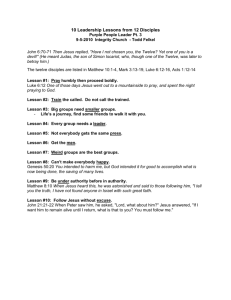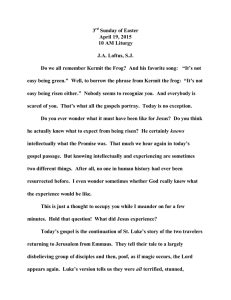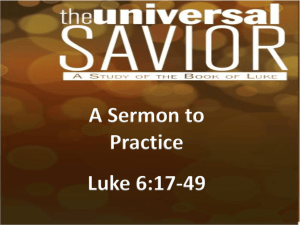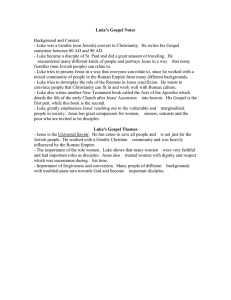3 Sunday of Easter April 22, 2012
advertisement
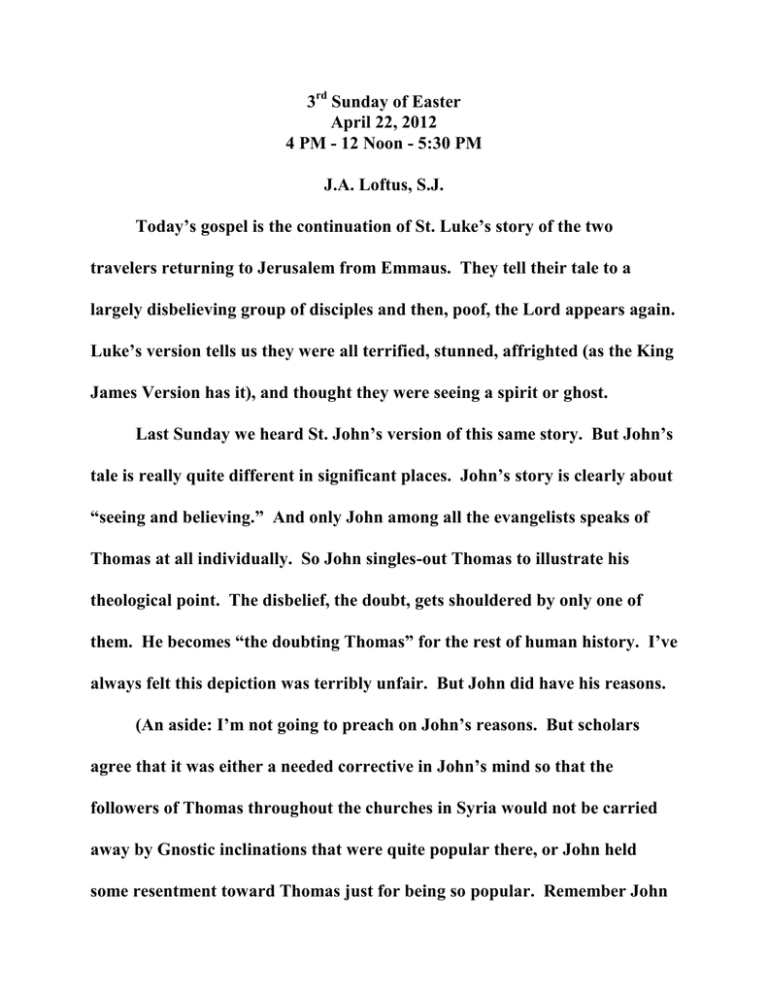
3rd Sunday of Easter April 22, 2012 4 PM - 12 Noon - 5:30 PM J.A. Loftus, S.J. Today’s gospel is the continuation of St. Luke’s story of the two travelers returning to Jerusalem from Emmaus. They tell their tale to a largely disbelieving group of disciples and then, poof, the Lord appears again. Luke’s version tells us they were all terrified, stunned, affrighted (as the King James Version has it), and thought they were seeing a spirit or ghost. Last Sunday we heard St. John’s version of this same story. But John’s tale is really quite different in significant places. John’s story is clearly about “seeing and believing.” And only John among all the evangelists speaks of Thomas at all individually. So John singles-out Thomas to illustrate his theological point. The disbelief, the doubt, gets shouldered by only one of them. He becomes “the doubting Thomas” for the rest of human history. I’ve always felt this depiction was terribly unfair. But John did have his reasons. (An aside: I’m not going to preach on John’s reasons. But scholars agree that it was either a needed corrective in John’s mind so that the followers of Thomas throughout the churches in Syria would not be carried away by Gnostic inclinations that were quite popular there, or John held some resentment toward Thomas just for being so popular. Remember John is writing almost 40 years after the main events in Jerusalem. Somebody had to be the “fall-guy,” the scapegoat. Why not Thomas, the popular?) But let’s come back to Luke in today’s gospel. Notice that here everyone is in doubt, is frightened (terrified in most translations), and feels stunned. And there is no “week later” individual conversation with Thomas about Jesus’ hands and feet. No, here Jesus himself suggests they all touch him. And then he eats some broiled fish with them–clearly implying “I am not a spirit or ghost.” Watch me eat! Then Jesus ever so gently breaks open the scriptures for them in that Upper Room just as he had for the two on the road to Emmaus. No one is castigated for not believing. No one is admonished about having doubts. Jesus seems to know that experiencing himself in his risen life does not provide for an easy adventure. And sure enough, all the disciples come to believe, as we do–mostly. But Jesus recognizes that everybody needs help with belief. And being frightened and doubtful seems to come with the territory. A marvelous Presbyterian minister and spiritual guide, Frederick Buechner, writes this: “Whether your faith is that there is a God or that there is not a God, if you don’t have any doubts you are either kidding 2 yourself or asleep. Doubts are the ants in the pants of faith. They keep it awake and moving.” (Beyond Words) For those of a more philosophical and poetic bent, the great Spanish novelist, philosopher, and poet Miguel de Unamuno is even more brief. “Faith which does not doubt is dead faith.” St. Luke in his characteristic way is the gentle healer here–and he is speaking directly as much to us as to his first listeners. Jesus understands, in Luke’s version, that his risen presence is sometimes incredulous. For every one person who can genuinely bask in the glow of our new Paschal candle, there are ten others who just try real hard to experience a smidge of what all the hoopla is all about. People’s real lives are often complex and frequently heavy and burdened. It was true for those first disciples (they had just lost their best friend and their best hope). And it is still true for many of us. We all have our own losses and disappointments, and our own deaths. So if singing lots of extra Alleluias just gets you down rather than up.... If you find yourself still trying to actually experience the Paschal joy and peace of the season.... If you can’t even bring yourself to say an “Alleluia’ (like many at our own church services).... Know you are in good company. 3 To paraphrase Kermit the frog: “It’s not easy being Risen. It scares people. As you can tell by now, I like St. Luke’s version a lot. I take comfort in the fact that Jesus himself will continue to invite us–all of us–to touch him, to reach out, and to not be afraid–even when we do not understand and remain frightened. That may be the more subtle message of Easter. I am and will be with you until the end of time–really! And for that gift, maybe we can mutter one Alleluia quietly. Peace! 4

